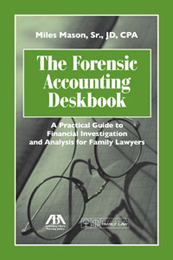
The book is exceptionally well organized, with numerous guides and examples that can be used as templates or guides for your current cases. The Forensic Accounting Deskbook begins with an introduction to forensic accounting and engaging the right CPA for your case. It then moves into accounting for lawyers, which is an excellent overview. Many of the common accounting buzzwords and catch phrases are defined, and knowing what these mean will be invaluable to the attorney. The more you know about the financial issues, the better you can advocate for your client.
Miles then goes on to list many common red flags of fraud in divorce cases – – warning signs that may indicate one spouse is hiding income or assets. Unless you know there is a problem, you can’t do anything about it. So be aware of these common suspicious characteristics in divorce cases. The Forensic Accounting Deskbook also details many of the common ways money is concealed in a family law matter. Familiarize yourself with these so you can understand what your forensic accountant is talking about.
The chapter on discovery lays out a detailed list of items you may consider requesting from the other side, and explains why it is so important that the records produced be complete. One missing statement could contain the smoking gun, and you don’t want to risk your client’s case by overlooking it. There are also several examples of requests for production for specific parties who could be asked to produce documents, including the employer, the self-employed person, a mortgage broker, the brokerage firm or financial advisor, a CPA who has prepared income taxes or financial statements, banks, and credit card issuers.
The Forensic Accounting Deskbook then moves into the more hard-core financial analysis discussion. This section of the book will be especially helpful to forensic accountants who want to develop their skills, find new ideas for investigations, or discover some practice templates and checklists that may aid in their examinations.
Miles gives excellent explanations of how to perform the following in a financial investigation in a divorce case:
- The eyeball and smell test – Do the financial documents and interrogatory responses make sense?
- Transaction detail listing and analysis – This is the sometimes painstaking process of recording every transaction for a period of time, categorizing each item, in order to analyze historical spending, “… impute income identify and classify assets, determine dissipation, identify commingling, argue transmutation, and calculate appreciation of separate property.”
- Reconciling tax returns and financial statements
- Do a proof of cash
- Review Quicken or Quickbooks software
- Complete a vertical analysis – Show each expense item as a percentage of revenue, and look for unusual changes over time.
- Do ratio analysis – Analyze various financial statement items in conjunction with one another to identify unusual relationships, which could indicate fraud
- “SCORE” evaluation – Calculating items related to a company’s suppliers, customers, owners, regulators, and employees to identify anomalies in the numbers reported
- Transaction sampling and testing – Items of interest are examined, often tracing amounts to source documents to determine the accuracy and completeness of accounting records
The book then discusses valuation of assets such as retirement accounts, brokerage accounts, and businesses, as well as using tax returns to uncover hidden assets. Although lawyers will typically not be doing valuations or evaluating the tax returns for hidden income (this is best done by a financial expert), this section offers valuable information that can help you understand the process.
The most useful chapters of the Forensic Accounting Deskbook deal with Determining Income and the Lifestyle Analysis. These two areas of financial analysis in divorce cases are the most commonly needed (especially in high net worth divorce), but often least understood. Even some forensic accountants who hold themselves out as experts in family law make frequent mistakes in these analyses.
These chapters describe the various methods for determining income, focusing on issues of hidden income and how it can be uncovered. The lifestyle analysis is critical to demonstrating the lifestyle of the family prior to the divorce, comparing and contrasting it to the income claimed to be earned by both parties after the separation. These calculations are critical in determining spousal support and child support amounts, as they will show historical spending and suggest future needs. In the case where one party has deliberately reduced his income or otherwise made it appear that income is not available for support, a lifestyle analysis can refute this.
The Forensic Accounting Deskbook closes with information on reports and testimony. Miles outlines a suggested format for reports, which is a useful checklist for any expert. More importantly, he details deposition and trial questions that should be used to establish the foundation for a forensic accounting expert’s qualifications. The Appendix to the book includes several useful guides, including a deposition checklist for questioning an opposing forensic accountant. As with the rest of the book, this list of questions is incredibly thorough yet directed.
I recommend the Forensic Accounting Deskbook to any attorney or expert witness working in the area of family law. There is something to be learned for everyone, and the numerous checklists, samples and guides will be invaluable to your practice.
Memphis divorce lawyer, Miles Mason, Sr., JD, CPA practices family law exclusively and is founder of the Miles Mason Family Law Group, PLC, in Memphis, Tennessee. He authored The Forensic Accounting Deskbook: A Practical Guide to Financial Investigation and Analysis for Family Lawyers, published by the American Bar Association. Miles is past Chair of the Tennessee Bar Association Family Law Section and is a prolific author and public speaker on divorce trial practice presenting seminars to attorneys, forensic accountants, and business valuation experts. For more information, see www.MemphisDivorce.com.



